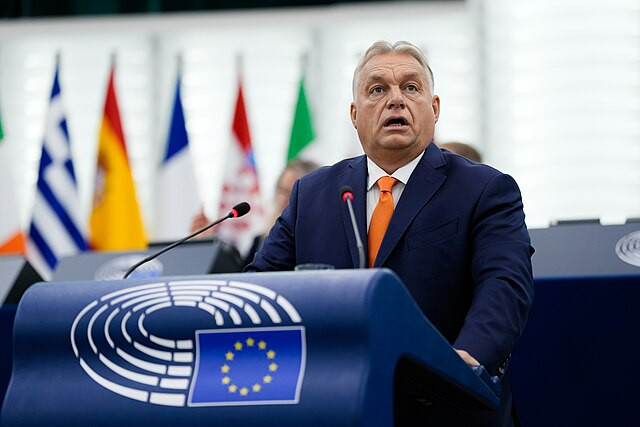Hungary will begin the process of withdrawing from the International Criminal Court, Prime Minister Viktor Orban announced Wednesday during a visit by Israeli Prime Minister Benjamin Netanyahu, who is currently wanted by the court for alleged war crimes in Gaza. The move signals a major break with European Union legal norms and comes as Orban deepens his alliance with Israel.
"This very important court has been diminished to a political tool and Hungary wishes to play no role in it," Orban said during a press conference in Budapest alongside Netanyahu. The Israeli leader called the decision "bold and principled," and added, "It's important to stand up to this corrupt organization."
Hungary's decision follows the ICC's May 2024 issuance of arrest warrants for Netanyahu and former Israeli Defense Minister Yoav Gallant, as well as three senior Hamas leaders. The court stated that there were "reasonable grounds" to believe Netanyahu bore criminal responsibility for war crimes, including "starvation as a method of warfare," and crimes against humanity such as murder and persecution.
Netanyahu has dismissed the ICC's case as "absurd and antisemitic." His office previously said, "Israel utterly rejects the absurd and false actions and accusations against it by the International Criminal Court, which is a politically biased and discriminatory body."
Despite Hungary's obligations as a signatory of the Rome Statute-the treaty that established the ICC-Orban's government made clear it would not enforce the warrant. Gergely Gulyas, Orban's chief of staff, said in November that although Hungary ratified the Rome Statute in 2001, it was "never made part of Hungarian law," rendering it unenforceable in the country.
Hungary's State Secretary for International Communication Zoltan Kovacs confirmed Thursday that the legal process for withdrawal had begun and would proceed "in line with Hungary's constitutional and international legal obligations." The process is expected to take approximately one year.
The Netherlands, where the ICC is headquartered, reminded Hungary that until the withdrawal is completed, it remains obligated to fulfill its duties under the treaty. "The full process to withdraw from the ICC takes about a year, during that time Hungary will have to fulfil all its obligations to the court," said Dutch Foreign Minister Caspar Veldkamp.
Netanyahu's trip to Hungary marked his first visit to a European country since the ICC issued the warrant. He was received with full honors, including a red-carpet ceremony at Buda Castle. Stickers and posters supporting Israel's October 7 victims are widespread in Budapest, and the city's Holocaust memorial has been adorned with yellow ribbons in solidarity with hostages held by Hamas.
The European Union has shown a mixed response to the arrest warrants. While countries such as Ireland and Spain said they would comply and arrest Netanyahu if he entered their territory, France and Germany issued more reserved statements, questioning whether the court had jurisdiction, as Israel is not a member of the ICC.
The ICC, which lacks its own enforcement arm, relies on member states to arrest and extradite individuals under indictment. Hungary's defiance highlights the court's limited power and growing political challenges. If its withdrawal is completed, Hungary would become the only EU country to exit the ICC.
The arrest warrant against Netanyahu aligns him with other world leaders indicted by the court, including Russian President Vladimir Putin and former Libyan leader Moammar Gadhafi. The United States, which is not a party to the Rome Statute, has also criticized the ICC's actions. Under former President Donald Trump, the U.S. imposed sanctions on ICC personnel.
The charges against Netanyahu stem from Israel's war in Gaza, launched in response to a Hamas-led assault on southern Israel that killed 1,200 people and resulted in more than 250 hostages, according to Israeli officials. Palestinian authorities say over 50,000 people have been killed in Gaza during the Israeli offensive.
The ICC also issued arrest warrants for Hamas leaders Yahya Sinwar, Mohammed Deif, and Ismail Haniyeh. All three have since been confirmed killed in Israeli military operations.




